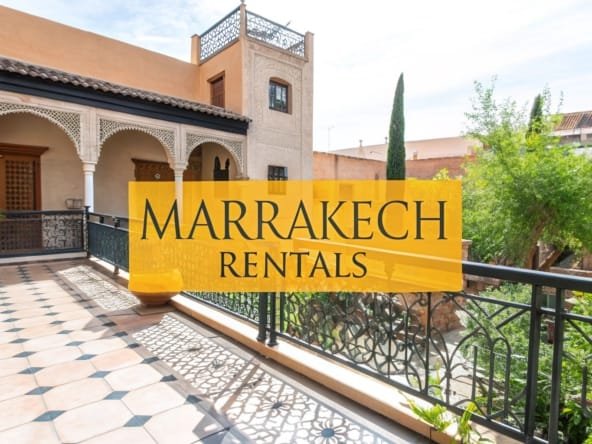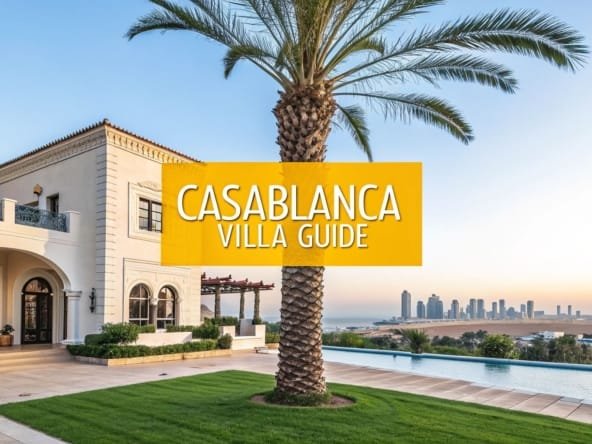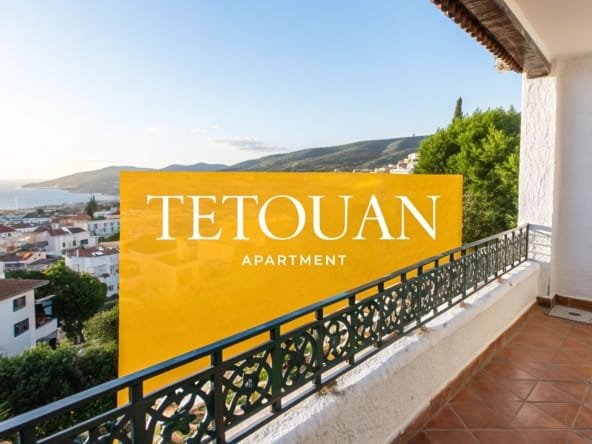When you think of Marrakech property, your mind might instantly conjure images of a timeless riad tucked away in the ancient Medina. For years, that was the quintessential dream. But today, the city's real estate scene offers a vibrant, modern alternative that's capturing the attention of savvy buyers: immobilier neuf, or new-build property.
These new developments offer a refreshing, hassle-free path to ownership. They expertly blend contemporary luxury with the legal and financial certainty that older homes often lack, giving you a turnkey solution from day one.
Why New Builds Are Reshaping the Marrakech Market
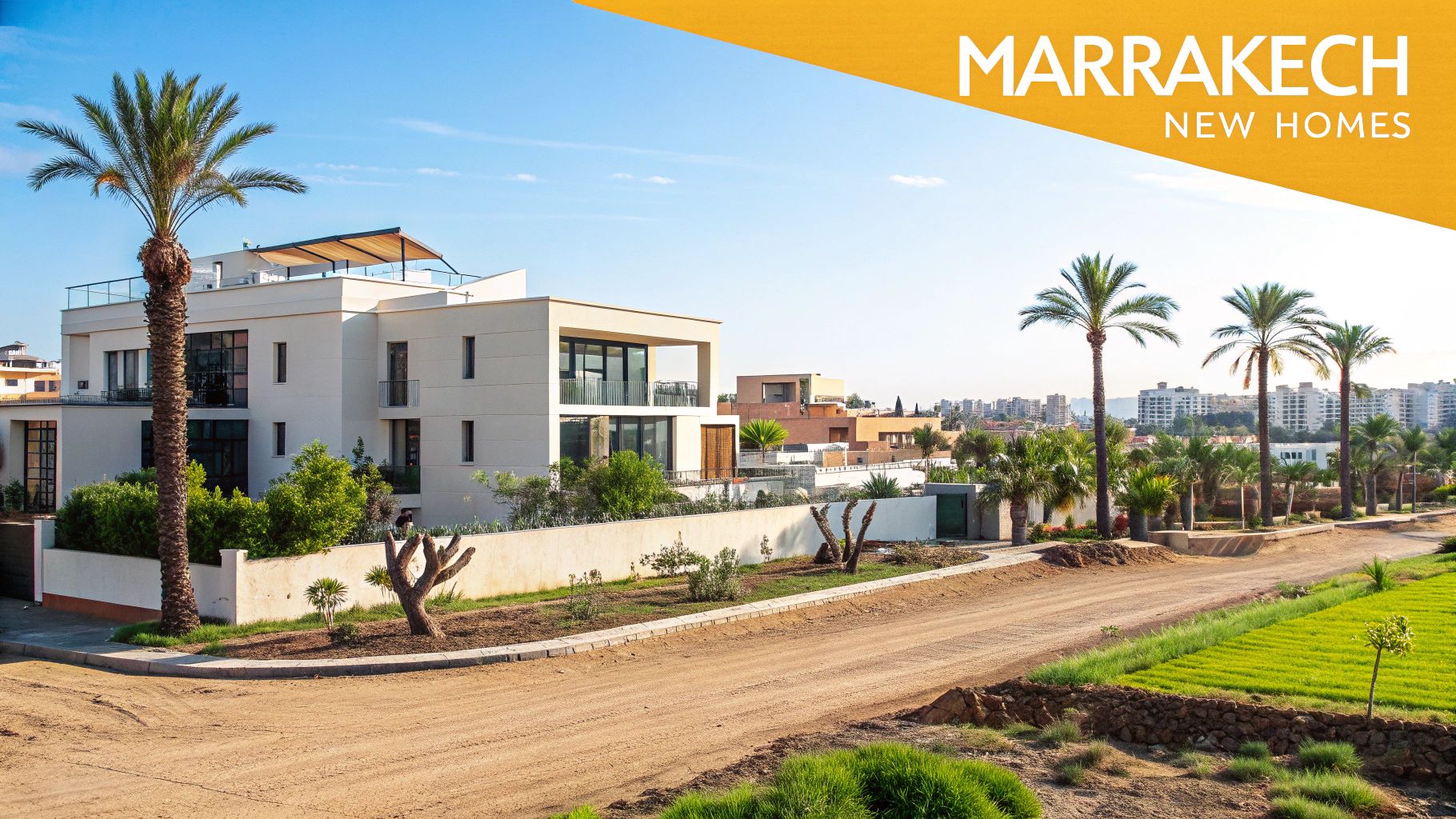
For decades, buying in Marrakech meant embarking on the romantic—but often gruelling—journey of restoring a historic riad. While the charm is undeniable, so are the unpredictable renovation costs and tricky legal snags that can come with it. A powerful shift is now underway, with more and more buyers looking towards the modern appeal of Marrakech immobilier neuf.
This isn't just about choosing something new over something old. It's about choosing certainty and a specific lifestyle. It's the difference between managing a construction project and simply unlocking the door to your finished home, built to the highest modern standards.
The Modern Advantage
The real draw of a new build lies in its seamless combination of comfort, security, and quality. New constructions in Marrakech are built for the way we live today, offering features that would require extensive—and expensive—updates in an older property.
Here’s what sets them apart:
- State-of-the-Art Amenities: Think secure underground parking, professionally managed swimming pools, fitness centres, and lush communal gardens—all ready for you to enjoy.
- Energy Efficiency: Built to current regulations, these homes feature superior insulation and modern systems, which translates to lower utility bills and a lighter environmental footprint.
- Developer Guarantees: Unlike a traditional property sold "as is," a new home comes with built-in legal guarantees that protect your investment from construction defects.
Opting for a new build in Marrakech is really an investment in your peace of mind. You’re buying a finished product with clear costs and strong legal protections, freeing you up to enjoy the lifestyle from the moment you turn the key.
A Market Responding to New Demands
The real estate landscape in Marrakech is incredibly dynamic, influenced by both local and international tastes. You have the historic charm of the Medina on one hand, and on the other, the modern elegance of new developments in areas like Targa or along the Ourika Road. This creates a market with something for everyone, from investors looking for a boutique hotel project to families wanting a comfortable, modern home.
As buyer priorities have shifted, especially post-pandemic, towards larger living areas and private outdoor space, developers have listened. They are now delivering projects that cater specifically to these desires. To get a fuller picture, it's worth reading up on the latest Marrakech market dynamics. You'll see how stability and a focus on eco-friendly construction are setting the stage for solid long-term growth.
Your Step-By-Step Guide to Buying New Property in Marrakech
Diving into Marrakech’s new-build property market can feel like navigating a vibrant, bustling souk—exciting, but a little overwhelming at first. The good news is that the buying process is a well-trodden path, with clear, secure steps designed to protect you. It’s less of a maze and more of a structured journey.
Think of this guide as your roadmap. We'll walk through the entire process, from finding the right person to guide you to the moment you’re handed the keys to your new home. With key professionals like specialised agents and official notaries involved at every turn, you can move forward with confidence.
Stage 1: Engaging with an Expert Agent
Your first and most important step is to find a reputable real estate agent who lives and breathes Marrakech immobilier neuf. This isn’t just about finding someone to show you listings; it’s about partnering with a local expert who can be your guide on the ground. They have an insider's view of the market, know which developers have the best track records, and often get access to top-tier projects before they even hit the open market.
A great agent does far more than unlock doors. They'll help you pinpoint your goals, negotiate effectively with the developer, and champion your interests from start to finish. Their experience is your best defence against common mistakes, making the whole process smoother and more secure.
Stage 2: The Preliminary Sales Agreement
Once you’ve found the perfect property, it’s time to make it official by signing a preliminary sales agreement, known locally as the ‘Compromis de Vente’. This is a serious, legally binding contract that locks in all the critical details of the sale between you and the developer. Once signed, the property is officially reserved for you.
This crucial document will detail everything, including:
- A full property description: The exact size, layout, and specifications of your new home.
- The final purchase price: Along with a clear, agreed-upon payment schedule.
- The handover date: A projected completion date, which is vital for off-plan purchases.
- Any specific conditions: Known as 'clauses suspensives', these are conditions that must be met for the sale to go ahead, such as securing your financing.
The 'Compromis de Vente' is the legal foundation of your purchase. It’s far more than a simple reservation form—it protects both you and the developer by locking in the price and terms, preventing any unexpected changes later on.
Stage 3: The Crucial Role of the Notary
In Morocco, every property transaction is overseen by a ‘notaire’ (notary). This isn't just a formality; the notary is a neutral, state-appointed legal official whose job is to ensure the entire sale is legal, transparent, and secure. They are your ultimate safeguard.
The notary's main responsibility is to perform meticulous due diligence. This involves verifying the property’s legal title (‘titre foncier’), confirming the developer has all the necessary building permits, and checking for any legal claims or debts against the project. All your payments will also pass through the notary's secure escrow account, not directly to the developer, adding another layer of protection.
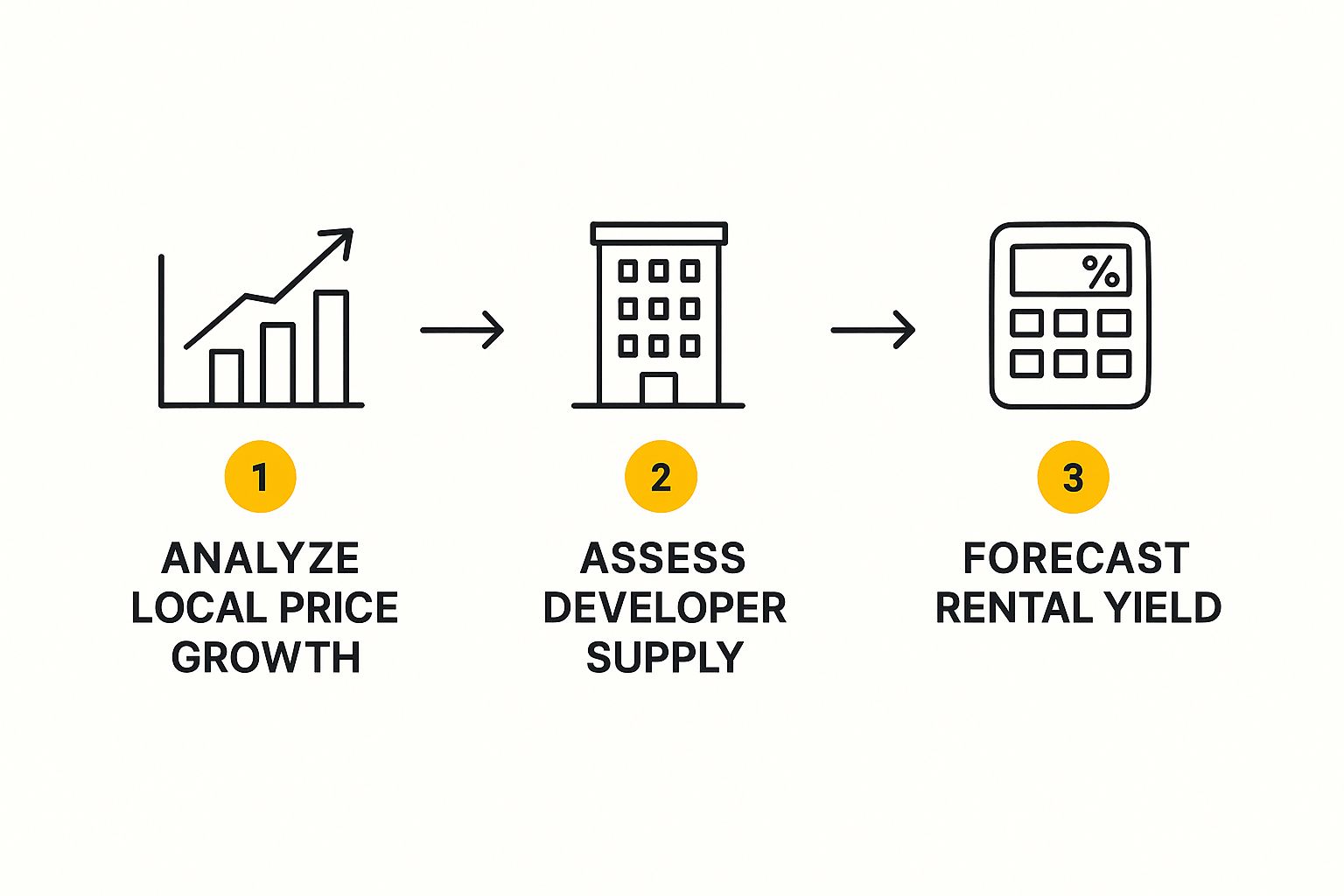
This data-first approach, focusing on price trends, supply, and potential returns, is exactly what ensures your investment is grounded in market reality, not just wishful thinking.
Stage 4: Understanding Off-Plan Purchases (VEFA)
Many of the most exciting new developments are sold off-plan, a process governed by a very specific legal framework in Morocco called VEFA ('Vente en l’État Futur d’Achèvement'). This system was created specifically to protect buyers. Instead of paying the full price upfront, your payments are made in instalments tied directly to construction progress.
For instance, you'll make a payment when the foundations are complete, another when the structure is roofed, and so on, right up to the final payment upon completion. This means your money is only released as real, tangible work is done. What’s more, VEFA law requires developers to secure a financial completion guarantee, which is an insurance policy ensuring the project will be finished, even if the developer runs into financial trouble.
It's a robust framework that gives you tremendous peace of mind when buying a home that hasn’t been built yet. For an even deeper dive, you can explore the secret to buying property in Marrakech revealed by seasoned professionals.
Finding the Perfect Location for Your New Marrakech Home
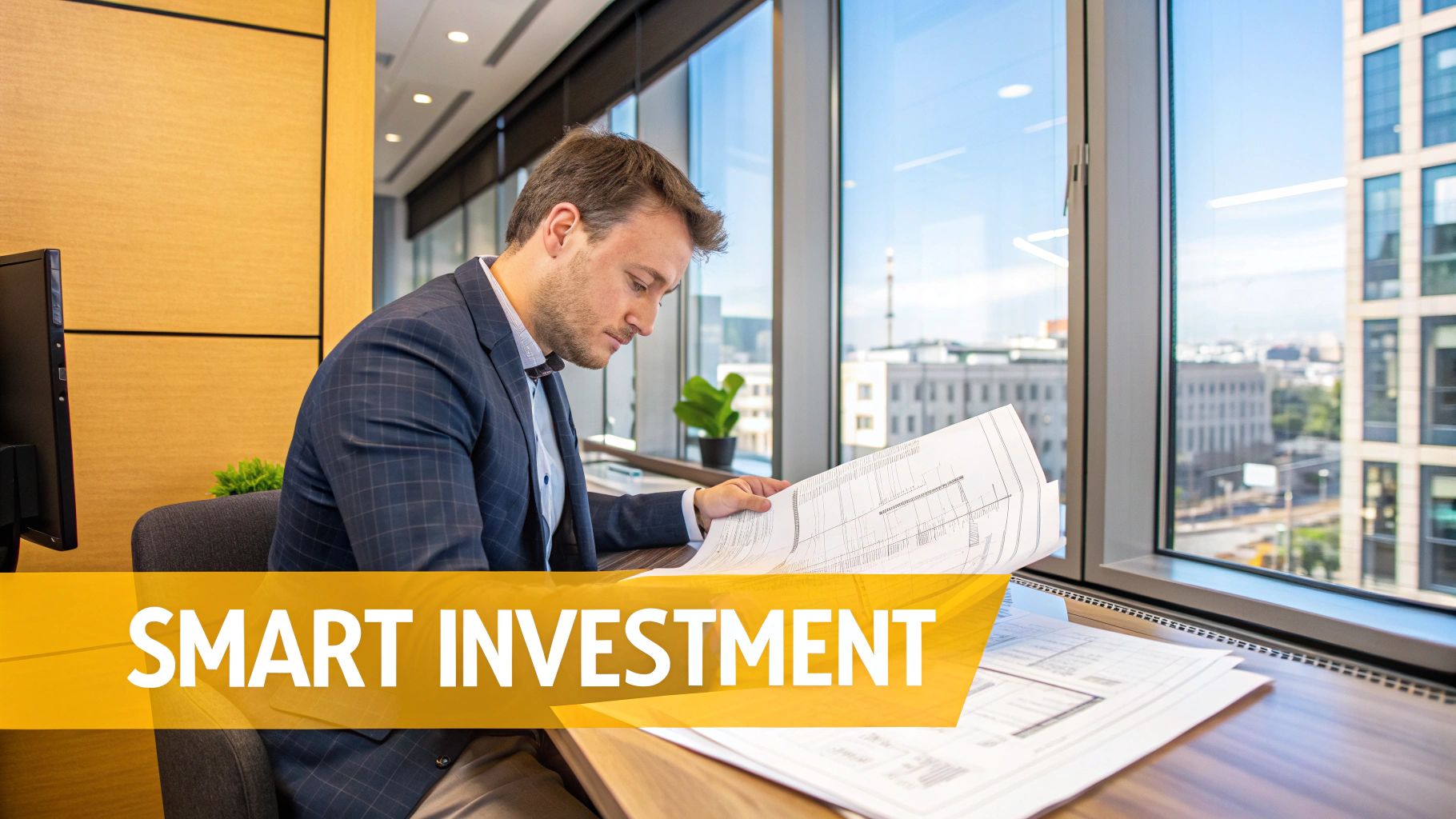
Deciding to invest in Marrakech immobilier neuf is the first step. The next, and arguably most important, is choosing the right neighbourhood. This is where your vision for life in the Red City truly begins to take shape.
Each district in Marrakech has its own distinct personality and rhythm. Think of it like choosing a soundtrack for your daily life. Do you crave the vibrant, energetic beat of a modern city, or the tranquil, serene melody of a private oasis? Your ideal spot hinges entirely on the lifestyle you want to lead.
Let's move beyond just names on a map and explore the character of the city's most sought-after areas for new developments.
Guéliz and Hivernage: The Heart of Modern Marrakech
For anyone who thrives on the buzz of city living, Guéliz and Hivernage are the undeniable hotspots. These neighbouring districts are the contemporary soul of Marrakech, offering a sophisticated, cosmopolitan lifestyle just a stone's throw from the ancient Medina.
- Lifestyle: This is urban living at its finest. Picture yourself living amongst chic art galleries, high-end boutiques, and some of the city's top international restaurants. Life here is dynamic and convenient, attracting professionals, couples, and savvy investors after strong rental yields.
- Amenities: Everything you need is right on your doorstep. From trendy cocktail bars and luxury hotels to international banks and modern clinics, it's the very definition of convenience.
- Price Point: Unsurprisingly, this prime real estate comes with a premium. New apartments in Guéliz and Hivernage command some of the highest prices per square metre in Marrakech.
The Palmeraie: Exclusive and Serene Villa Living
Just a short drive from the city's energetic core, the Palmeraie feels like another world entirely. This legendary palm grove is a byword for luxury, home to opulent resorts and stunning private villas. New developments here focus on exclusive, secure villa communities that deliver ultimate privacy without sacrificing access to world-class amenities.
The Palmeraie isn’t just a location; it's a statement. Investing here means choosing a lifestyle of peaceful seclusion, surrounded by natural beauty and exceptional golf courses, while still being closely connected to the vibrant city centre.
This area is the perfect fit for those seeking a prestigious primary residence or a lavish holiday home. It’s long been a haven for discerning international buyers and affluent Moroccans who place a high value on space, security, and prestige.
Targa: A Modern Hub for Families
As Marrakech continues to grow, neighbourhoods like Targa have blossomed into vibrant, family-friendly communities. Located to the west of the city centre, Targa offers a more relaxed pace of life and represents fantastic value for money. The Marrakech immobilier neuf market here is buzzing with modern apartment complexes and contemporary villas set within secure, gated communities.
What’s the appeal of Targa?
- Family-Oriented Amenities: The area is well-equipped with private schools, nurseries, and local shops, making it a great place to raise a family.
- Excellent Value: You’ll find your money goes much further here. A budget that gets you a small apartment in Guéliz could secure a much larger, brand-new property in Targa.
- Modern Infrastructure: The district is well-planned with wide avenues and plenty of green spaces, creating a comfortable and easy living environment.
Recent data paints a picture of a stable and resilient Marrakech real estate market. As of early 2025, the city saw a nominal residential property price increase of about 0.32% year-on-year. While modest, this stability is a strong indicator of the market's health, particularly for new properties in both the upscale and mid-range segments. If you're considering a second home, our guide on why Marrakech is the perfect location for your holiday home offers even more great insights.
Getting Your Finances in Order for a Marrakech Property
Navigating the financial side of your purchase is arguably the most critical step. Getting the funding sorted for your Marrakech immobilier neuf (new-build property) is a well-trodden path, whether you’re a Moroccan local or buying from abroad. It all comes down to working with local banks and being fully prepared for the costs that go beyond the initial price tag.
Think of it this way: the property itself is the beautiful car you've picked out, but the financing is the engine that makes it run. A solid financial plan is what will get you from the showroom to your new home without any bumps in the road.
Working with Moroccan Banks
For almost everyone, buying a new property means getting a mortgage from a Moroccan bank. The good news? They’re completely accustomed to handling real estate financing for both residents and international clients, so you'll find a decent range of competitive loan options.
Your first move is to put together a solid application file. While the exact list of required documents might differ slightly from one bank to another, the essentials are pretty standard. They're all designed to give the bank a clear picture of your financial health and your ability to manage the loan repayments.
Here’s what you’ll generally need to have ready:
- Proof of Identity: Your Moroccan ID card (CNIE) or your passport if you're an international buyer.
- Proof of Income: This means recent payslips, an employment contract, or recent tax returns to show you have a steady income.
- Bank Statements: You'll typically need to provide statements from the last three to six months to show your savings and cash flow.
- Preliminary Sales Agreement: This is the ‘Compromis de Vente’ for the specific property you plan to buy.
Getting mortgage pre-approval before you even start seriously looking at properties is a massive advantage. It gives you a firm, realistic budget and instantly signals to developers that you're a serious buyer, which can really strengthen your hand during negotiations.
How Financing Works for New Builds
The structure of your loan will be different depending on whether you’re buying a property that’s already finished or one that's still being built—known as an off-plan or VEFA project. This distinction is key for managing your payments.
- Completed Property: This is the simple route. If the home is move-in ready, your bank will release the full loan amount to the notary as soon as you sign the final deed of sale. It’s a one-and-done transaction.
- Off-Plan (VEFA) Property: For a property bought off-plan, the financing is tied directly to the construction progress. Your bank releases the money in stages, matching the payment schedule you have with the developer. This pay-as-it's-built approach is a great safety net, ensuring funds are only released as tangible work gets done.
Budgeting for the True Cost of Buying
A classic mistake many buyers make is focusing only on the purchase price and forgetting about the closing costs. In Morocco, there are several mandatory taxes and fees you'll need to pay on top. It’s crucial to factor these into your budget from day one.
As a rule of thumb, you should plan for these additional costs to be around 6% to 8% of the property's price.
To help you get a clear picture, we've put together a table breaking down the typical buyer costs for a new property in Marrakech.
Estimated Buyer Costs for New Property in Marrakech
| Cost Item | Estimated Percentage of Property Price | Description |
|---|---|---|
| Registration Tax | 4% | This is a government tax on the property sale. It's paid when the transfer of ownership is officially registered. |
| Notary Fees | 1% – 1.5% | This is the professional fee paid to the notary for handling the legal paperwork, due diligence, and finalising the sale. |
| Title Fees | 1.5% + Fixed Fee | Known as ‘Conservation Foncière’ fees, this covers the cost of registering your title deed and securing your legal ownership. |
Getting a firm handle on these associated costs early on means you can build a truly accurate budget. This kind of financial clarity puts you in a strong position, allowing you to deal with banks and developers with confidence and ensuring there are no nasty surprises on your journey to owning a new home in the Red City.
Understanding the Legal Framework That Protects You
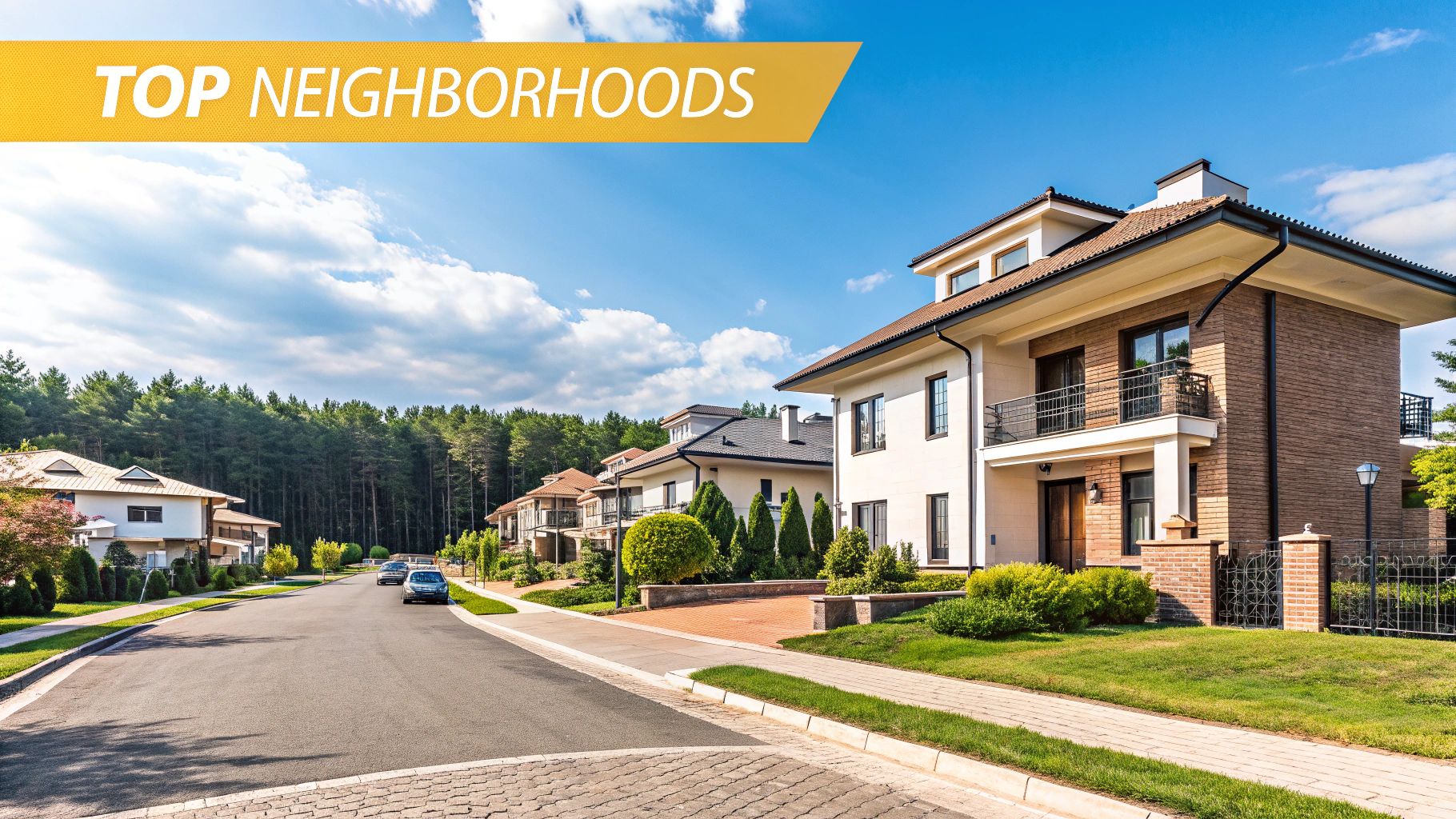
For most people looking to buy property abroad, the legal side of things can feel like a minefield. But when it comes to Marrakech immobilier neuf, you might be surprised to learn just how robust Morocco's legal framework is. It's specifically built to protect you and your investment.
This isn't just a dusty old book of rules. Think of it as a series of built-in safeguards that turn a potentially complex purchase into a secure, transparent, and surprisingly straightforward transaction. Once you get to know it, the law becomes your biggest source of confidence.
The Notary: Your Guardian in the Transaction
In Morocco, the ‘notaire’ (notary) is much more than just someone who stamps documents. They are a state-appointed legal official, acting as a completely impartial guardian for the entire deal. Their job is to represent the interests of both you and the state, ensuring everything is above board.
Their role is central to the process and cannot be skipped. Before a single dirham changes hands, the notary carries out a deep dive into the property's background. This includes a thorough check of the legal title, known as the ‘titre foncier’, to confirm the developer actually owns the land and has the legal right to sell it.
They'll also hunt for any hidden debts, liens, or legal claims tied to the property. This exhaustive due diligence guarantees you receive a clean title, free from any nasty surprises down the line.
Key Documents That Lock In Your Ownership
As you move through the buying process, the notary will handle several key documents, each adding another layer of legal protection. For a new build, one of the most crucial is the ‘Permis d'Habiter’, or certificate of habitability.
This isn't just a piece of paper. It's an official certificate issued by the local authorities only after a full inspection. They verify that the property has been built exactly according to the approved architectural plans and meets all safety and construction codes. It's the official green light, confirming your new home is safe and ready to live in.
Crucially, the final sale cannot legally go through without it. This holds the developer's feet to the fire, ensuring they deliver precisely what they promised.
Think of the legal framework as the solid foundation your investment is built on. The notary is the master builder, meticulously checking every single component—from the title deed to the final permits—to make sure the entire structure is sound and secure for years to come.
Powerful Developer Guarantees Under VEFA Law
Buying off-plan, known as VEFA (Vente en l'État Futur d'Achèvement), comes with some of the strongest buyer protections you'll find anywhere, all enshrined in Moroccan law. Developers are legally obligated to provide powerful guarantees that shield your investment.
The big one is the completion guarantee, or ‘garantie d'achèvement’. This is essentially an insurance policy, backed by a bank, that guarantees the project will be completed, even if the developer runs into financial trouble. This single guarantee practically eliminates the biggest fear associated with buying off-plan.
But it doesn't stop there. Developers are also on the hook for other warranties long after you've moved in:
- One-Year Warranty: This covers any minor finishing defects you might spot in your first year.
- Two-Year Warranty: This protects against faults in building equipment, like doors, windows, or shutters.
- Ten-Year Warranty (‘Garantie Décennale’): This is a huge one. It's a powerful guarantee that covers major structural defects in the building’s foundation and frame for a full decade.
With this legal framework in your corner, you can step into the Marrakech property market with genuine confidence, knowing your investment is secure and well-protected.
The Future Outlook for Marrakech New Build Investments
When we look at the future of Marrakech immobilier neuf, it’s clear the market is on a very solid footing. This isn’t just wishful thinking; it’s being driven by real economic growth and a shift in what buyers are looking for. Choosing a new-build property here is more than just buying a beautiful home—it’s a savvy investment in a city that’s constantly growing, which points to strong potential for capital appreciation down the road.
The appeal is straightforward. New builds offer a hassle-free, move-in-ready experience with a level of quality, modern features, and legal security that you just don't get with older riads or villas. This sense of confidence and comfort is now being amplified by some exciting trends that are really starting to define the future of property in Marrakech.
Emerging Trends Shaping the Market
The next wave of new construction in Marrakech is really focusing on three key areas. You can see how global shifts in lifestyle are being adapted to fit the unique character of the Red City.
- Sustainable Construction: More and more, people want homes that are kind to the planet. Developers are getting on board, using green materials and installing energy-efficient systems. This not only reduces the home's environmental footprint but also means lower utility bills for the owner.
- Integrated Smart Home Technology: Convenience is king. New developments are now commonly built with smart home features as standard—think automated lighting, climate control, and top-tier security systems you can manage right from your phone.
- Purpose-Built Lifestyle Communities: It's no longer just about the four walls of your apartment. Developers are now creating entire living environments. We’re seeing communities designed around shared wellness centres, co-working spaces, and even organised social gatherings, which helps build a genuine neighbourhood feel from day one.
These shifts aren't just ideas; they're backed by a booming Moroccan construction sector. The market is projected to hit around MAD 97.39 billion by 2025 and is expected to climb to MAD 112.33 billion by 2029. Marrakech is right at the heart of this expansion, which means we can expect a continuous supply of high-quality new projects for years to come. For a deeper dive, you can check out a full analysis of the Moroccan construction market's growth.
The sweet spot for Marrakech’s future real estate market is where modern luxury, sustainable living, and solid economic fundamentals meet. For an investor, this is a golden opportunity to get into a market that isn’t just growing, but is also maturing to meet the highest international standards.
All things considered, the future for new-build investments in Marrakech looks incredibly strong. The city’s relentless development, combined with an obvious push towards quality and innovation, cements its place as a top-tier global property destination. If you're weighing your options, there’s no better time to explore the top reasons to invest in Marrakech real estate in 2024. Understanding the opportunities on the horizon makes it that much easier to take the next step with confidence.
Frequently Asked Questions
When you’re looking at Marrakech immobilier neuf, a few questions are bound to pop up, especially if this is your first time exploring the Moroccan property market. We’ve pulled together the most common queries from buyers—both local and international—to give you the straightforward answers you need.
Think of this as your final checklist. It’s here to clear up any lingering doubts and make sure you feel completely confident moving forward with your investment.
Can Foreigners Buy New Property in Marrakech Without Restrictions?
Absolutely. Foreign nationals can buy new apartments and villas in Marrakech’s designated urban areas with minimal fuss. When you complete a purchase, you receive a freehold title deed, known locally as the ‘titre foncier’.
This deed gives you the same full ownership rights as a Moroccan citizen, meaning you’re free to own, sell, or rent out your property as you see fit. The only real restriction applies to agricultural land, which won't be a factor for almost any new residential development. A certified notary must handle the transaction, ensuring everything is above board and your title is properly registered.
What Is VEFA and How Does It Protect Buyers?
VEFA stands for ‘Vente en l'État Futur d'Achèvement’, which is Morocco's official legal framework for buying property off-plan. It’s a system designed from the ground up to protect the buyer.
A key feature is how you pay. Instead of a single large payment upfront, your payments are made in instalments tied directly to proven construction milestones.
Even better, the law mandates that the developer must secure a completion guarantee (‘garantie d'achèvement’) from a bank. This is essentially an insurance policy. It guarantees your home will be finished, even if the developer runs into financial trouble. It’s a robust system that gives you real security when investing before a project is complete.
The VEFA framework transforms an off-plan purchase from a leap of faith into a secure, regulated process. By linking payments to progress and mandating a financial completion guarantee, it effectively minimises buyer risk and holds developers accountable.
What Ongoing Taxes and Fees Should I Expect After Purchase?
Once you’re a property owner in Marrakech, there are a couple of annual local taxes to keep in mind. They’re standard for everyone and are easy to factor into your yearly budget.
Here’s a simple breakdown of what to expect:
- Residence Tax (‘Taxe d'Habitation’): An annual tax calculated on the property's rental value. The great news for new-build owners is you get a five-year exemption on this tax if the property is your main home.
- Municipal Services Tax (‘Taxe de Services Communaux’): This covers local services like rubbish collection and street cleaning.
- Syndicate Fees (‘Frais de Syndic’): If your home is in a managed complex, you'll pay monthly or quarterly fees. These cover the upkeep of shared spaces like gardens, swimming pools, security, and cleaning.
Ready to explore the best new properties Marrakech has to offer? The expert team at Rich Lion Properties provides personalised guidance to help you find the perfect investment. Discover your dream home today by visiting https://richlionproperties.com.

